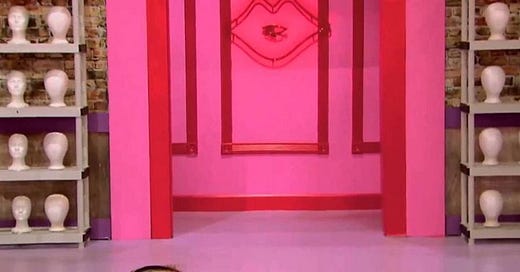Your Principles Vs. Your Principal
You're not a Teacher, You're an Employee Trainer Training Future Employees (Yikes!)
For an entire year when I taught first-grade, I kept having to scream, “No more fake falling!” It was my “No wire hangers!” moment as an educator.
A trend of bogus pratfalls had gripped my class and reached epidemic levels amongst the 7-year-old boys. The constant fake falling was driving me up the wall and interrupting precious instructional time.
The class would be silently working in a pedagogical harmony when all of a sudden Eduardo or Jacob or Danny would collapse onto the floor along their books, pencils, and crayons. The bam-crash-clatter-clatter-clatter would jump-scare everyone including me.
All the kids would compliantly turn their heads toward the fallen student, pause for a second, then release raucous peals of laughter. “Spontaneous” falling is apparently really funny to first graders. The little Buster Keatons would regain their composure, and then smile mischievously as they announced the obvious, “I fell.”
My degree in American Literature hadn’t prepared me for this tomfoolery.
Who was I supposed to be in this situation? The cool teacher who laughed along with the on-going prank or a Vladimir Putin-like figure who would declare triple martial law and ban all chairs from the classroom? Try falling out of your chair now, Eduardo.
The situation led me down a cascade of existential teacher questions:
How does an educator stop a craze of fake falling? Why is this even an issue I have to deal with? What was I doing in room full of seven-year-olds anyway? Shouldn’t I be at a coffeehouse writing The Great Chicano Novel? What is a teacher? What is teaching? How do I even do this job?!!! Help.
I eventually got some insight into what was actually expected of me as a schoolteacher while I was attending a math workshop at the California Club, a fancy-schmancy private social club in Los Angeles.
The keynote speaker at the training was a businessman, some captain-of-industry-fellow who had come to sell us educators on a computer program called Jiji Math. The theme of his talk was math competency in our students.
As us teachers sat quietly at round tables, the c-suite executive began to relay how terribly worried he was because the employees he was hiring seemed woefully unprepared for the mathematical tasks required of the jobs he needed to fill.
He proceeded to tout the software featuring a cartoon penguin as a panacea for low math scores. He also generously shared with us his idea of what public schooling is supposed to be. (Everyone seems to have a strong opinion of what teachers should be doing.)
His speech soon veered into one of those critiques of American education which insists that our public schools are failing at their job while the Finnish and Chinese schools are out-scoring us and about to take over the world with their kindergarteners’ calculus skills. These Chicken Littles always seem to be in a panic because they think American civilization is on the brink of collapse due to our students’ lack of Algebra 2 competency.
His essential point was that his computer software, Jiji Math, was good for instruction, which was good for schools, which was eventually going to be good for employers. Afterall, teachers need a lot of help training our future employees.
I don’t get paid to train your employees, I thought to myself.
I’m not an employee trainer, I rebutted to nobody.
That’s when the realization hit me. Oh my god. People actually think teachers are supposed to be employee trainers. Important, powerful people, like politicians and parents and superintendents and CEOs and principals, think teaching is training.
They think that my responsibility is to prepare children for the jobs created by “The Economy” (whatever the hell that is) and somehow anticipate the skills needed for whatever occupations exists in the year 2050 (if any).
My internalized, unspoken rebuttal to the keynote speaker went something like: If you want your employees better trained in math, then have them better trained in math at your expense, on your time, at your facility. (This might be why charter schools are so popular with CEO-types. Corporations have decided to co-opt public education in order to reduce their overhead and labor training costs.)
As I sat on that cushy conference chair, I was in the throes of one of those existential teacher moments when a flood of questions inundates your educator’s conscience (if you have one):
· What is my purpose?
· Why do I do what I do?
· Who’s in control?
· Should I go to Mexico or Croatia for my summer break?
Okay, maybe the last question was not as existential as the others but, you know, priorities.
What you think you do and what society thinks you do can be, apparently, very, very different, and maybe even in opposition to each other. The tension between the two might prove to be problematic as a teacher’s career progresses, depending on how big the chasm is between the school district’s mission and your personal teaching philosophy.
Some teachers are perfectly content to consider themselves employee trainers. There is zero daylight between the goal of the post-industrial economy and their classroom. Their rooms include mini-workstations and byzantine homework instructions that essentially replicate the students’ eventual office cubicle and the 1040 tax forms of the adult world.
Other teachers have never given over one daydream to what their purpose is. They have paychecks and summer breaks to focus on. But those educators are probably not reading this Substack, and are usually found, at recess, across the street from the smoke-free campus sucking on a cancer-stick and sipping a Red Bull.
If you haven’t had one of these teacher-existential crises yet, they are sure to arrive down the line because dilemmas always arise in public education. There are just too many competing stakeholders for there not to be dilemmas—moral, ethical, and otherwise.
The promise is this: eventually someone with more power or influence will come along and tell you what your job is supposed to be—a superintendent, a principal, a powerful parent, a bajillionaire with money and a bucket list that includes solving malaria, colonizing Mars, and then something about destroying public schools.
What these super-powered stakeholders lay out as the purpose of public education WILL PROBABLY NOT resonate with you, but you will already have a livelihood vested in your regular paycheck and dental insurance and that scheduled, non-refundable trip to Cancún.
Choices, maybe even some compromises, will have to be made between what your personal principles dictate and what your principal dictates.
If you find yourself in this dilemma, before you start pushing back, I want to remind you of something that I kept forgetting to my detriment: you are an employee before you are a teacher.
Many teachers forget this and often find themselves in hot water and without a job because they believed they were right about something their bosses didn’t agree with. This may be a moral stance against over-assessment or a religious disbelief in teaching evolution. Maybe your state does not allow you to discuss gender or sexuality. Maybe you’re not allowed to pray your religion out loud in the middle of a lesson. The issues run a wide encompassing gamut of controversy. As a school district employee will have to negotiate something sooner or later.
At the other end of the spectrum, however, if you compromise too much and too often, burnout will creep into your being and not only show up as an illness but as a trap—the trap of an adequate job that provides you an adequate livelihood while it simultaneously degrades your moral compass and physical wellbeing.
That is teaching. Especially right now in America.
Districts, boards of education, and school principals don’t care what you personally think is right or true. It’s a shut-up-and-teach type of environment.
A teacher has to get clear on what teaching is to them and then keep it to themselves.
Answer some basic-ass questions for yourself:
· Why am I a teacher?
· What do teachers do?
· What is the purpose of public education?
Engaging in these philosophical internal dialogues early on in your career will prepare you for the inevitable moments of challenge. Your answers will offer you a yardstick to measure how far away the job is getting from you and what you think teaching should be. It will help you answer if you need to get away from the job.
Eventually the boys in my first-grade class stopped fake falling— maybe they grew bored of the antic or maybe they actually listened to all my scolding. I doubt it was the latter.
But at some point I realized that all along they had been practicing something independent of my syllabus. It was their own little rebellious curriculum. They had been rehearsing how to be bad employees, ready and willing to file some dubious workers’ comp claims if they ever, you know, fell on the job.
Maybe elementary school is a place for training employees after all.






